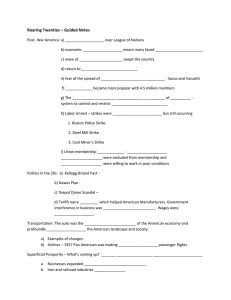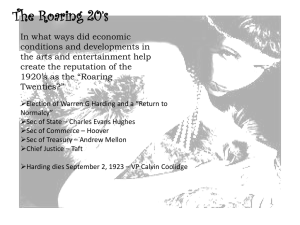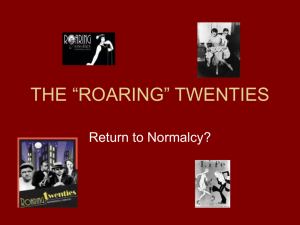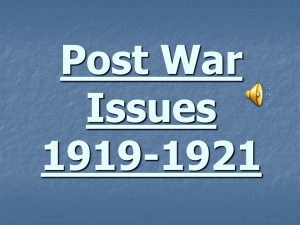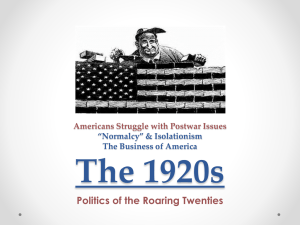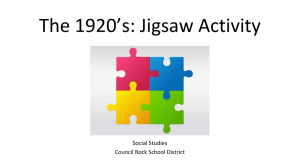US History Lesson Plan
advertisement
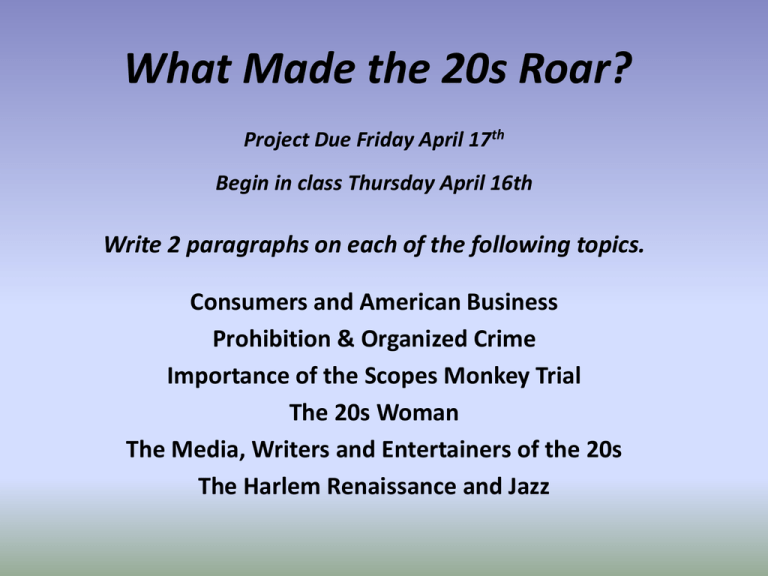
What Made the 20s Roar? Project Due Friday April 17th Begin in class Thursday April 16th Write 2 paragraphs on each of the following topics. Consumers and American Business Prohibition & Organized Crime Importance of the Scopes Monkey Trial The 20s Woman The Media, Writers and Entertainers of the 20s The Harlem Renaissance and Jazz Postwar America Recession Nativism Again Labor Unrest Warren G. Harding’s Return to Normalcy The Country Prospers Sudden Recession • Government contracts cancelled – war ended fast • Sudden strong demand for previously “rationed” goods, but prices rose quickly. • Government price controls removed & without future orders producers hiked prices. • Inflation wrecked savings • Businesses failed; workers lost jobs; unions lost gains • Economy…about face! Internal US Politics • America had become accustomed to being aware that enemies were around, from WWI propaganda. • Between 1918 and 1921 Americans rejected foreign influence. • When the Russian Revolution sought to spread Communism, nearly 70,000 people joined the Communist Party in America. • Many were union members, and anarchists who wanted to eliminate private property. • Attorney General A. Mitchell Palmer fought the “Red Scare” by finding radicals. Signs of Nativism Returning • “Palmer Raids” August 1919 - Radicals, anarchists & socialist clubs were raided - Private homes, meeting halls searched without warrants and rights abused to squash dissent. • Sacco & Vanzetti Trial - 2 Italian immigrant anarchists executed for a murder they may not have committed • Ku Klux Klan Revived – 100% Americanism - Fear of changes occurring and immigrant job seekers, resentment over gains made by blacks led to a brief revival • 1921 Emergency Quota Act results in limits on immigrants from Europe – excludes Japanese Nativism • When else in our study of US History, have we seen the effects of Nativism? • What were the signs of Nativism? • How do they differ from this instance? • How could we discuss Nativism in an essay? Labor Seeks Delayed Gains Strikes occurred over low wages and bad working conditions. WWI kept workers from raises for a long time. After the war they struck to make their gains Boston Police Strike Calvin Coolidge denies right to strike if public safety threatened. Public Outrage won support for dealing harshly with unions. Steel Mill Strike Militant labor leaders gave Steel Union radically run reputation. Coal Miners Strike John L. Lewis made gains here – more money – but no working condition improvements or shorter work week until 1930s. Labor Loses its Appeal • Expanded workforce with immigrants who had no choice but to work & wouldn’t strike. • Multi-lingual workers couldn’t communicate well. • Farmers wary of others’ efforts on their behalf. They were used to doing it themselves. Normalcy and Isolationism • Warren G. Harding urges return to simpler times and works for international peace thru Isolationism. • 1921 – Washington Naval Conference US, Great Britain, France, Japan & Italy agree on an arms control formula limiting warships. • 1929 Kellogg-Briand Pact – Major powers renounce war as an instrument of foreign policy. Tariffs Cause Problems • 1922 - Fordney-McCumber tariff to protect American business as it returns to peacetime production. • Closes US to sales by Europe – couldn’t sell anything so had no money to pay us back! Set stage for depression. • France threatens to take German territory to generate funds from natural resources. • To avoid another war, US loans $ to Germany to pay France & England so they could pay us back! Scandals in Harding’s Term Teapot Dome Scandal Western Government owned land rich with oil was to be used for navy as fuel for ships. Albert Fall, Sect’y of Interior had it transferred from Navy Department to Interior Department. Allowed it to be leased to oil companies for big profits. Society and Business • • • • Automobile spreads out cities – “Urban Sprawl” New roads linked cities & rural communities – Route 66 New businesses & industries – airlines and vacations Transportation again coincides with business. When else in American History did we see this trend? • Advertising makes consumer goods attractive. • Buying on Installment makes the good life affordable. • Leads to the Roaring 20s
